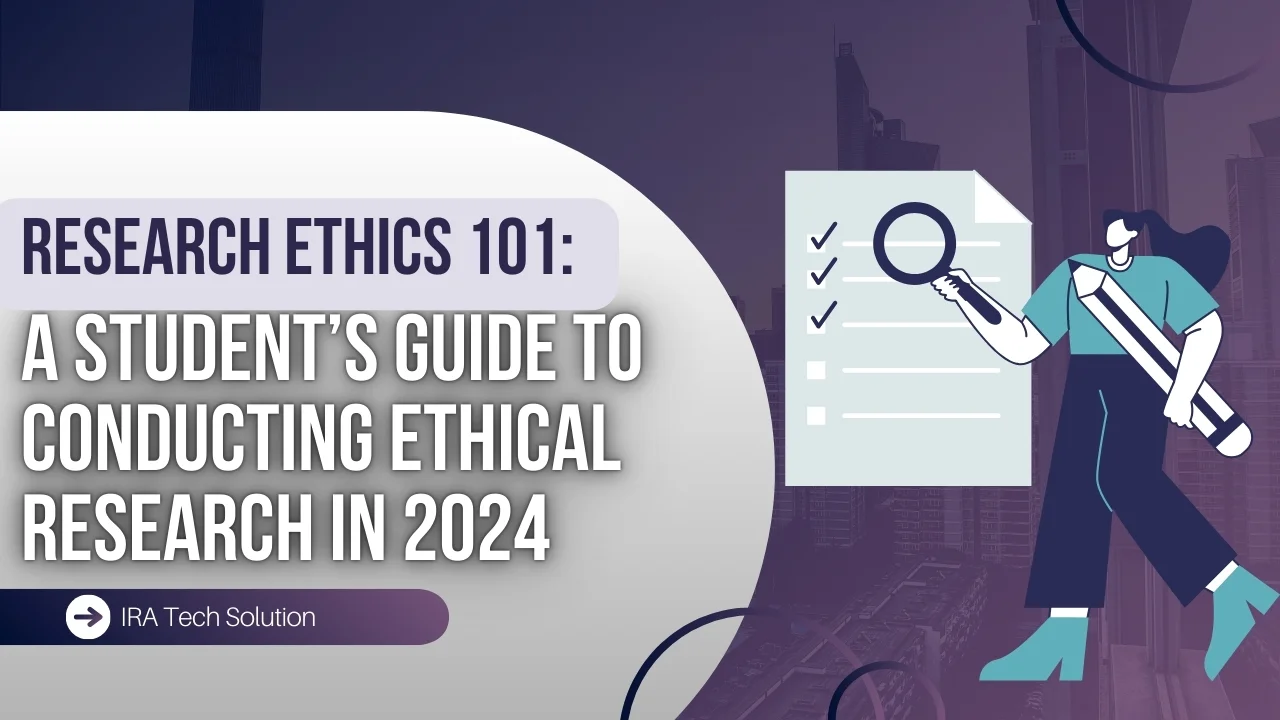
- October 29, 2024
- IRASolutions
- 0
Introduction:
What is the research ethics? Ethics have a significant importance in the study since the learners need to be answerable in their studies. They minimize likelihood of violating participants’ rights besides improving public confidence in research findings. Scientific values refer to research professionalism, respect for the general public, improved scientist characteristics, and protection of both participants and study findings. This assists students to create accurate knowledge.
Understanding the Foundations of Research Ethics
Imperative to any research process is the enjoyment of research ethics as the foundation of responsibility in research. They guarantee that research is carried out to the best practices of ethics by (term checking). Evaluating to ethical principles preserves its integrity of the research in addition to welfare of the participants.
What Are Research Ethics?
Research ethics, therefore embrace the standards of right conduct in proposing, conducting and reporting research. They guarantee credibility, authoritativeness and relevancy also protecting the participants from any harm. The four basic principles of research ethics are to be honest while collecting data, not to plagiarize information, and self-report any conflict of interest, all of which is for the sake of maintaining good relations among the researchers who are engaged in development of new ideas in the society.
The Core Principles of Ethical Research
The principles of research ethics which form the foundation of ethical research include respect for persons, parentalism, and justice. Informed consent is part of the participants’ respect and participant autonomy. Beneficence means producing the utmost good and equal or lesser harm, and justice in relation to participants’ selection and distribution of benefits and burdens, to maintain research’s ethical purity.
Ensuring Informed Consent
Informing participant, a study involves informing them in an ethical manner, and being fully aware of the research and its aim is crucial to ethical research. It keeps them self-governed, foster trust without compromising them and avoids doing something with questionable effects, it is ethical.
The Importance of Informed Consent in Research
The concept of informed consent plays a central role in research. Participant must understand the aims of the planned study, methods, possible dangers and their rights. This ethical requirement promotes honesty and confidence since people are in a position to make their particular decisions for the purpose of helping to consider their attention away from being exposed to possible harm and abuse during the conducting of researches.
How to Obtain and Document Informed Consent
In order to get informed consent researchers need to provide complete information on the nature and intent of the research, methods to be used, possible dangers, and advantages of the study. Consent must be written; it must also be voluntary; participants must be able to withdraw at any given time without consequences. This process serves to attain ethical principles in research.
Avoiding Plagiarism and Ensuring Originality
Having original work is the ultimate respect to academic honor. There are certain rules researchers have to follow, mainly regarding citation and paraphrasing, to achieve both the accuracy of references and constructing the authors’ credit.
Plagiarism in Academic Research: How to Avoid It
Cheating is the act of submitting someone else work or copying someone else ideas with intent of passing it as own work and this attracts severe disciplinary measures from universities. Investigators have to credit sources, use quotations regarding copies, and paraphrase effectively. These are some of the things, which should not be taken lightly and include; citation styles and copyright.
Tools and Techniques to Ensure Original Work
This way researchers should use several tools and techniques to avoid duplication. Sometimes unintentional copying can be learnt using the plagiarism detection software like turnitin or Grammarly. Getting the best literature reviews make it easy to come up with distinct points of view. The planning and documentation promote objectivity of sources and help with idea conceptualization. Also, making creativity and critical thinking enhances the invention of creative writing styles in academics.
Data Integrity and Transparency
A key factor which forms reliability of research findings is accuracy and accountability of the information collected. This makes data collection and reporting credible so that conclusions that will be made will be valid and repeatable by others. Transparency makes it easier for other players in the academia to replicate the work that is being done.
The Importance of Accurate Data Collection and Reporting
Why research ethics are important? High credibility and reliability are critically important to the collection of data and reporting in research. Since inaccurate information give wrong conclusions, it affects the participants and undermines the public credibility. This is because obeying strict, transparent procedures and refraining from fabrication results in validity thus improving the credibility of both research and practice, as well as refining the exchange and practice of knowledge and practices.
How to Ensure Data Transparency in Your Research?
Data openness can be defined as the openness and understandable of data. Researchers get to this by offering adequate method explanation, data analysis, and the limitation of the study. To make it easier for other researchers to work with, one must release the raw data in public domain. With the help of the tools of open science including study pre-registration and protocol sharing, the published research is more trustworthy and rigorous
Privacy and Confidentiality in Research
Two of the basic ethical concerns for any researcher is the issue of participant privacy and ensuring that responses remain anonymous. As for the researchers, they need to do everything possible to protect people’s information being collected, and thereby maintain trust.
Protecting Participant Privacy
The anonymity of the participant is one of the most basic duties of the researcher with regards to the ethical consideration. As shown, scholars have to pay particular attention to the methodology of personal data capturing and processing, which requires access restrictions. The author maintains that participants must understand when and how data is used and where the data is stored. This way, researchers earn trust, people contribute their information and research results are accurate.
Best Practices for Safeguarding Confidentiality
In order to conceal the identities of research subjects, authors are obliged to adhere to several measures. When patient consent is obligatory, they should provide the necessary sections concerning privacy and data protection. Key management strategies would be such things like data encryption, and data storage and data access. Observing patient/ respondent anonymity through staff training in organizational policies and procedures also improves the overall research and ethical standard.
Ethical Considerations for Vulnerable Groups
Subgroups include children and the elderly, and they demand further measures to protect their rights during research. For these reasons, these groups are vulnerable to exploitation, and while undertaking research one must fairly balance the goal of the research and the rights of the group with the ethical considerations of the research.
Special Protections for Vulnerable Populations in Research
People that fall within categories of children and elderly should especially be protected as they easily become vulnerable to exploitation. These groups must be informed and aware of what is involved and the inherent risks of the research endeavor by the researchers. In the case of children each procedure must be accompanied by the consent of parents or other legal representatives when this is possible and participation in the study must be voluntary. Research should reduce harm-related dangers while focusing on how to meet the requirements of sensitive populations.
Ensuring Fair Treatment and Minimizing Harm
The education of treatment of vulnerable groups is very important in research. It is appropriate for researchers to use measures that create fair participation in research and avoid marginalized groups. The appraisal of risks for the likelihood of adverse effects to occur and considering operational plans to counter the risks is necessary. Thus, when aiming at the benefit of these groups, the researchers exercise ethical and social sensitivity.
The Role of Institutional Review Boards (IRBs)
IRBs have the responsibility of regulating how ethical research should be completed. They scrutinize research proposals to prevent a violation of participants’ rights and to preserve the credibility of the research process therefore enhancing confidence amongst the public.
Why Institutional Review Boards Are Crucial for Ethical Research
Institutional Review Boards (IRBs) control ethical matters in research by considering the proposal’s compliance with regard to the human rights as well as dignity of participants. They assess principle of informed consent, principle of risk, as well as the principle of protection of vulnerable groups.
How Students Can Navigate the IRB Process
Some suggested approaches about self and general IRB include: It is before utilizing the IRB; discover usual and explicit demands of the institutional IRB. The students should develop a good research question that contains issues in research ethics and seek help from experienced members of the faculty. But before students can get the approval of the IRB, they must ensure that they review their work well.
Conclusion:
Ethical concerns are important and necessary no matter what kind of research a person is conducting, or when practicing as a professional. The two ensure the safety of participants and credibility of further research inquiries. Maintaining the ethicality of the experiment benefits participants while also maintaining the quality of the known. Scholars take precautions that help society and enrich academic institutions and other organizations as well.
Recent Posts
- SEO vs. AEO: Understanding the Differences and How They Impact Your Website

- SEO vs SMO: Understanding the Differences and Which One is Right for Your Business

- Importance of Core Web Vitals and Mobile Optimization for Pakistani Websites

- AI in SEO: How Pakistani Businesses Can Leverage AI for Better Rankings in 2025

- The Role of Quality Content in Today’s Digital World

Quick Links
Consectetur adipiscing elit. Duis at dictum risus, non suscip it arcu. Quisque aliquam posuere tortor aliquam posuere tortor develop database.





